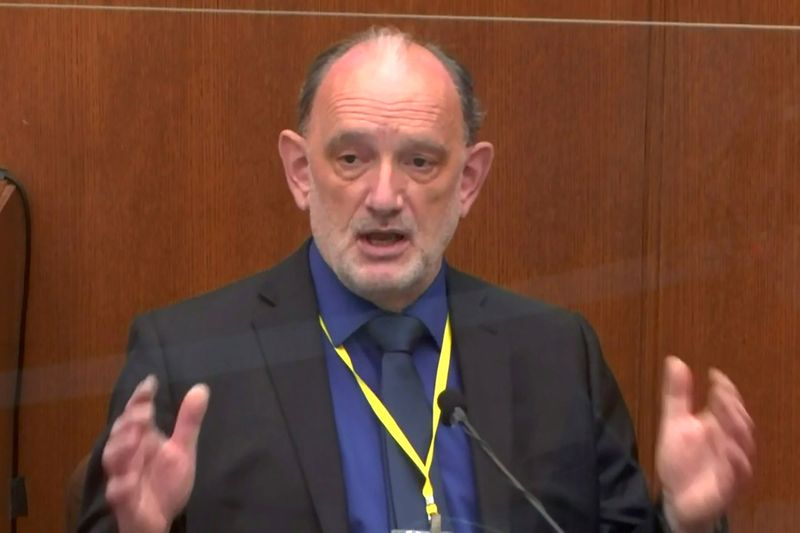By Jonathan Allen
MINNEAPOLIS (Reuters) - A medical expert who testified in defense of former Minneapolis police officer Derek Chauvin told jurors on Wednesday he believed George Floyd's death while under arrest was the result of heart disease which made his heart beat erratically.
Dr. David Fowler, a forensic pathologist who was Maryland's chief medical examiner until his retirement in 2019, also told the jury he believed exhaust fumes from the police car next to which Chauvin pinned Floyd to the road may also have contributed to Floyd's death in May 2020.
Still, under cross-examination, Fowler agreed with a prosecutor who said Floyd should have been given immediate first aid when his heart stopped beating during the arrest, video of which sparked global protests against police brutality and racism.
Chauvin's central defense against murder and manslaughter charges has been to raise doubts about the cause of Floyd's death. Dr. Andrew Baker, Hennepin County's chief medical examiner, ruled the death a homicide last year caused by Chauvin and other officers restraining Floyd in a way that starved his body of oxygen.
Fowler, one of Chauvin's most important witnesses, disputed at least some of Baker's conclusions, telling the jury he believed the manner of death could be considered a homicide, but he would have instead ruled it "undecided."
Chauvin, who is white, was seen kneeling on Floyd's neck for nine minutes while Floyd, a Black man in handcuffs, pleaded for his life before going limp.
Fowler said Floyd's death was caused by his heart suddenly beating in an erratic way, known as sudden cardiac arrhythmia.
This was a result of his "atherosclerotic and hypertensive heart disease" during the police restraint, Fowler said, using medical terms to describe the narrowing of blood vessels and heart problems caused by high blood pressure.
Fowler said the way Floyd struggled with police trying to get him into their car may have caused stress that led to the sudden arrhythmia.
The fentanyl and methamphetamine found in Floyd's blood and carbon monoxide poisoning from the exhaust fumes of the adjacent police car may have contributed to the death, Fowler said.
Asked why Chauvin and other officers by the car were not harmed by carbon monoxide poisoning, Fowler replied that their heads were farther from the exhaust pipes than Floyd's, and "hopefully they're younger" than Floyd. At the time of Floyd's death, Chauvin was 44 and Floyd was 46.
'UNDECIDED'
The jury has previously heard from medical experts called by prosecutors from the Minnesota attorney general's office, who say Floyd had high blood pressure, a slightly enlarged heart and used opioid painkillers but that none of them caused his death.
Those experts agreed with the findings on Floyd's death certificate that his death resulted from being unable to inhale enough oxygen due to the way police compressed his prone body against the road. Baker, the chief medical examiner who certified Floyd's death, told the jury he stands by his findings.
Chauvin's lead lawyer, Eric Nelson, asked Fowler if Floyd died in a homicide or by some other manner of death.
"This is one of those cases where you have so many conflicting different manners," Fowler said. "The carbon monoxide would usually be classified as an accident, although somebody was holding him there, so you could elevate that to a homicide."
In the end, Fowler, the only witness who testified on Wednesday, said he would "fall back to 'undetermined' on this particular case."
Fowler has been involved in other high-profile cases involving police using force against Black people. His office ruled the 2015 death of Freddie Gray in Baltimore a homicide after Gray, 25, suffered spinal injuries in the back of a police van.
In December, Fowler was sued in federal court by the family of Anton Black, who was 19 when he died in 2018 in police custody. Fowler ruled Black's death an accident, but Black's family said Fowler and other Maryland officials "covered up and obscured police responsibility" for Black's death.
Under cross-examination, Fowler conceded to Jerry Blackwell, a prosecutor, that he did not know for certain whether the police car was still running during Floyd's arrest.
Chauvin kept his knee on Floyd's neck for more than three minutes after Floyd stopped breathing, which his own expert witness agreed was wrong.
"Are you critical of the fact that he wasn't given immediate medical care when he went into cardiac arrest?" Blackwell asked.
"As a physician, I would agree," Fowler replied.
